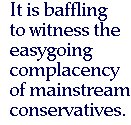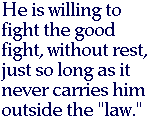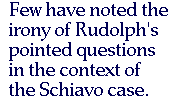
www.thornwalker.com/ditch/nowicki_taking_law.htm
Editor's note. In this column, Mr. Nowicki touches — and touches hard — on an issue that radically divides freedom-lovers as well as other thinking folk: the morality, or otherwise, of abortion. But if abortion be equated with murder, then all freedom-lovers who are not pacifists must agree that, in terms of the possibilities of moral action, much follows. Mr. Nowicki serves as our guide to some of it.On the matter of "pass[ing] laws," I think it is useful to note that Mr. Nowicki is only analyzing state action within the context of the state's own declared rules; he is not proposing any state action. Far from it!
Nicholas Strakon
Editor-in-chief, TLD
The law: in our own hands
or in no one's
By ANDY NOWICKI
| If you find this column of value, please send a donation of $2 to TLD. More information appears below. |
The continuing usurpation of the Constitution by judges who view themselves as priests of a "higher" law, the law of the free and exalted "spirit" rather than of the rigid and limiting "letter," was nakedly exposed in the Terri Schiavo case. Schiavo was permitted to be starved to death essentially because judges decided that lawmakers had no right to pass laws that offended the enlightened sensibilities of the judicial elite. In this particular case, those sensibilities meant allowing a man the freedom to have his wife killed by forbidding hospice workers to give her food or water.
However the legion of judges who voted "thumbs down" to Schiavo's right to live couched their language in legalese, there can be no doubt that they ruled the way they did for strictly ideological reasons. Like abortion (declared legal nationwide in 1973 under a bogus appeal to a supposed "penumbra" said to be found in the Constitution) and homosexual "marriage" (which, be assured, is coming soon to a courthouse near you), euthanasia is considered a "right" that deserves to be imposed by fiat, no matter how many legislators and voters express opinions to the contrary. Such "closed-minded" and "intolerant" sentiments against these judicial innovations must be dismissed out of hand, as must the objections of anyone who sees fit to point out that the U.S. Constitution in no way mandates the legalization of any of those practices.
 However, it is not really judges who are changing the landscape of our society,
planting the seeds of the culture of death and decadence. Their rulings would
never stand were they not accepted by a compliant population that has allowed
itself to be spiritually corrupted, and thus more easily brainwashed into
acquiescing to the dictates of their betters. Even the supposed opponents of the
new, homicidally oriented regime have shown remarkably little defiance in the
teeth of its incessant slaughter and ever-increasing appetite for totalitarian
control.
However, it is not really judges who are changing the landscape of our society,
planting the seeds of the culture of death and decadence. Their rulings would
never stand were they not accepted by a compliant population that has allowed
itself to be spiritually corrupted, and thus more easily brainwashed into
acquiescing to the dictates of their betters. Even the supposed opponents of the
new, homicidally oriented regime have shown remarkably little defiance in the
teeth of its incessant slaughter and ever-increasing appetite for totalitarian
control.
Indeed, it is baffling to witness the easygoing complacency of mainstream
conservatives today. Ignoring the depth and the urgency of the situation, they
typically seek to address the terrible problem of judicial tyranny by devoting
their energy to the slow, painstaking process of getting new laws passed,
which, once they go into effect, are expected to end the unconstitutional
atrocities, first mandated by usurping judges, that continue to occur in our time.
The conservatives mean well, but their patience is not a virtue. They seem not to
know, or care, that the same black-robed tyrants who saw fit to adjudicate such
travesties as Roe v. Wade won't in the least be fazed by any such feeble
challenge to the supremacy of their mandates; they will simply label such efforts
"unconstitutional," citing their own prior unconstitutional edicts as evidence. In
response, the conservatives will whine and groan and gnash their teeth but do
little more; their convictions, however deeply felt, are of little consequence since
their rhetoric isn't backed up by any willingness to go beyond mere
rhetoric.
A particularly sad example of that mindset can be found in Robert Schindler, the late Mrs. Shiavo's father. Schindler obviously believed strongly in his daughter's right to live and was willing to go to court several times to defend her from her husband's determination to kill her. Yet that, apparently, was as far as he was willing to go. According to reports, Schindler not only spurned the offer of some militia members to stage an emergency rescue effort but actually reported them to the authorities.
I don't wish to be too harsh in my assessment of Mr. Schindler's conduct under such circumstances. I have no idea what it would be like to have an injured daughter whom your son-in-law wanted to kill; perhaps Schindler's judgment was impaired, given the unbearable tragedy of his situation. Nor do I wish to gloss over the complicated dimensions of the case, as it seems that many conservatives have on occasion, particularly those who are bound and determined to see Michael Shiavo, Terri's husband, as a mere monster. It's not certain that Shiavo's intentions were evil; it is quite possible that he sincerely believed he was fulfilling his wife's wish by seeking to have her feeding tube removed.
Still, given that it is certain that Mr. Schindler sincerely believed his daughter was worthy of protection, I cannot understand, simply cannot fathom, his seeming utter unwillingness to entertain extra-legal possibilities to ensure that she be protected. I can't see his allowing a hair on his daughter's head to be harmed, regardless of the ruling of any judge anywhere at any time. As a father myself, I can say that it's hard to comprehend any father's consenting to the murder of his daughter, except over his own dead body.
 Thus it is difficult not to see Robert Schindler as an exemplar of the good-hearted but supremely timid man of principle in our times. He believes strongly
in pursuing justice and is willing to fight for his beliefs ... to a point. Or, more
precisely, he is willing to fight the good fight, continually, without rest, just so
long as that fight never carries him outside the dictates of the "law." It seems to
make no difference to him that the "law" in our day is an increasingly arbitrary
concept, defined by the powerful on the basis of their own prejudices and
whims. A good man, so thinks a fellow such as Schindler, would never go
against the orders of a judge, even when his own daughter's life was in
jeopardy. A good man doesn't ever break the law; he only appeals to it over and
over and over again, in front of judge after judge after judge. Even the fact that
his daughter is slowly starving to death doesn't give him permission (he thinks)
to declare the judges themselves unconstitutional and, as the saying goes, to
take the law into his own hands.
Thus it is difficult not to see Robert Schindler as an exemplar of the good-hearted but supremely timid man of principle in our times. He believes strongly
in pursuing justice and is willing to fight for his beliefs ... to a point. Or, more
precisely, he is willing to fight the good fight, continually, without rest, just so
long as that fight never carries him outside the dictates of the "law." It seems to
make no difference to him that the "law" in our day is an increasingly arbitrary
concept, defined by the powerful on the basis of their own prejudices and
whims. A good man, so thinks a fellow such as Schindler, would never go
against the orders of a judge, even when his own daughter's life was in
jeopardy. A good man doesn't ever break the law; he only appeals to it over and
over and over again, in front of judge after judge after judge. Even the fact that
his daughter is slowly starving to death doesn't give him permission (he thinks)
to declare the judges themselves unconstitutional and, as the saying goes, to
take the law into his own hands.
For all their fiery denunciations of elitist judges imposing liberal agendas, it is
difficult to discern anything like the "spirit of '76" in today's conservatives. The
abuses of our rulers today are far more egregious than those of the British
crown leading up to the Revolutionary War, yet the very men who are most
aware of those abuses, and purportedly most bothered by them, seem capable of
doing little more than engaging in Limbaugh-style rants. Indeed, the solution to
the problem can never be seen as anything more radical than writing your
congressman, voting Republican, and buying "Liberals Suck" T-shirts and
bumper stickers. At most, we can march in the street holding signs, or we can
pray the Rosary across the street from an abortion clinic. But — leaving
aside the question of the efficacy of Rosary prayers — we are never
allowed to entertain the notion of engaging in any actions that might actually
have the effect of changing the situation — that is, we are forbidden from
considering the use of force in order to save the innocent lives the state has seen
fit to refrain from protecting.
The rule is observable when we consider one of the few exceptions to it, namely the case of a man who was pleading guilty in an Alabama courthouse to numerous bombing attacks at the same time Terri Schiavo was perishing in a Florida hospice, her grief-stricken parents' legal efforts having gone for naught.
On the day of his sentencing, Eric Rudolph read aloud a 10-page political manifesto that he had composed the previous day. Rudolph cited opposition to the evil of abortion as the primary motivation for his terrorist activities, which included, most famously and infamously, the bombing of Centennial Park in Atlanta during the 1996 Olympics, which killed one woman and injured other passers-by, as well as bombings of abortion facilities in Atlanta and Birmingham, which injured workers and policemen and killed a security guard.
In his sometimes rambling but often surprisingly articulate and compelling statement, Rudolph, an obviously bright if never formally educated man, expressed no personal or even theologically based motivations for his actions. Instead, he insisted that abortion quite plainly violates natural law. "There is no more fundamental duty," he wrote, "than to protect the innocent from assault. This is inherit (sic) in the values of all higher civilizations."
Rudolph went on to address directly those timid conservatives who oppose abortion but condemn use of violence against abortionists and those who aid and abet their brazen assault on human life:
You have the right, the responsibility, and the duty to come to the defense of the innocent when the innocent are under assault. Would you protect your children from the clutches of a murderer? Would you protect your neighbors' children when (sic) they were under assault? If you answered yes to both of these, then you must support the use of force as justified in attempting to prevent the murder that is abortion.
 Few if any commentators have noted the irony of Rudolph's pointed questions
in the context of the Schiavo case, which was playing out simultaneously. One
wonders how Robert Schindler, a devout pro-life Catholic and assuredly a
devoted father, would have answered those questions. Presumably he would
have exclaimed, "Yes, of course!" in reply to both. Yet in his mind, for some
reason, the proposition didn't apply when the law of the land was intent upon
ensuring that his daughter be killed. When an agent of the state and his minions
are the murderers, or at least the accomplices to the murder, then a man's only
recourse is to endlessly appeal to the law, no matter how callously the law's
representatives continue to reject his appeals.
Few if any commentators have noted the irony of Rudolph's pointed questions
in the context of the Schiavo case, which was playing out simultaneously. One
wonders how Robert Schindler, a devout pro-life Catholic and assuredly a
devoted father, would have answered those questions. Presumably he would
have exclaimed, "Yes, of course!" in reply to both. Yet in his mind, for some
reason, the proposition didn't apply when the law of the land was intent upon
ensuring that his daughter be killed. When an agent of the state and his minions
are the murderers, or at least the accomplices to the murder, then a man's only
recourse is to endlessly appeal to the law, no matter how callously the law's
representatives continue to reject his appeals.
What in our age induces us to have this curious blind spot, allowing us to go easy on representatives of a criminal state for acts we could never forgive were they perpetrated by ordinary criminals? Can it be anything but a loss of nerve that makes today's conservatives so passionate about protecting innocent life, yet so unwilling actually to prevent the taking of innocent life while it is happening, by using force against those who take it, simply because the latter are protected by the law? — which is to say, by the arbitrary, ideologically determined decrees of a corrupt and arrogant elite? And does it indeed extend so far, this servility of ours to our rulers, that we are unwilling to violate the state's mandates even when they aim at taking the lives of our own children?
Eric Rudolph's four-year lone-wolf bombing campaign was shoddily performed, both in actual execution and often with regard to its moral import. Rudolph himself admitted that his killing of an innocent woman and injuring of several innocent people in Centennial Park (an attack for which it is hard to discern a legitimate motive) made the incident "a disaster — a disaster of my own making and for which I do apologize to the victims and their families." Similarly, his targeting of a homosexual nightclub, as repulsive an establishment as the place no doubt was, seems not to be morally justified. For those reasons, I do not hold Rudolph up as a person to emulate.
 However, I do think Rudolph deserves credit for his
willingness to act and suffer for his honestly held and mostly true convictions
about the evils of our age. And given both how far and how fast things have
fallen apart, and our ever-decreasing inclination to see outrages as outrageous
and atrocities as atrocious, one finds oneself wondering if it's really a good
thing that we have so many principled, yet utterly ineffectual men like Robert
Schindler around today, and so few bold if reckless men like Eric Rudolph.
However, I do think Rudolph deserves credit for his
willingness to act and suffer for his honestly held and mostly true convictions
about the evils of our age. And given both how far and how fast things have
fallen apart, and our ever-decreasing inclination to see outrages as outrageous
and atrocities as atrocious, one finds oneself wondering if it's really a good
thing that we have so many principled, yet utterly ineffectual men like Robert
Schindler around today, and so few bold if reckless men like Eric Rudolph.
July 9, 2005
© 2005 WTM Enterprises. All rights reserved.
If you found this column to be interesting, please donate something to our cause. You should make your check or m.o. payable in U.S. dollars to WTM Enterprises and send it to:
WTM Enterprises
P.O. Box 224
Roanoke, IN 46783
Thanks for helping to assure a future for TLD!
Notice to visitors who came straight to this document from off site: You are deep in The Last Ditch. You should check out our home page and table of contents.